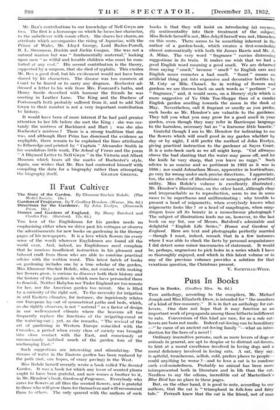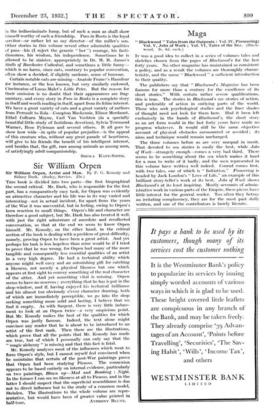Puss In Books
Puss in Books. (Geoffrey Bles. 8s. 6d.)
Tins anthology, according to the compilers, Mr. Michael Joseph and Miss Elizabeth Drew, is intended for" the members of a kind of free-masonry." It is in fact an anthology for cat- lovers. One dare not hope that it may function as an important work of propaganda among those hitherto indifferent to cats. Conversions of this kind are rare, for as a rule cat- lovers are born not made. Indeed cat-loving can be hereditary —" he came of an ancient cat-loving family "—what an intro- duction for the hero of a novel !
Ordinary insensitive persons, such as mere lovers of dogs or animals in general, are apt to despise or to distrust cat-lovers, to hint at a moral excellence involved in loving dogs and a moral deficiency involved in loving cats. A cat, they say, is spiteful, treacherous, Selfish, cold, prefers places to people— could anything be worse ?—and to love a cat is to condone such evil-mindedness. Probably no animal has been more misrepresented both in literature and in life than the cat. Needless to say the odious, incredible cat of Maeterlinck's Blue Bird has no place in these pages.
But, on the other hand, it is good to note, according to our authors, that the cat is " triumphant in folk-lore and fairy tale." Per ult knew that the cat is the friend, not of man
in the indiscriminate lump, but of such a man as shall show himself worthy of such a friendship. Puss in Boots is the loyal servitor—or rather let us say director—of the miller's son. Other stories in this volume reveal other admirable qualities of puss—his (I reject the generic "her ") courage, his fasti- diousness, his wisdom, his independence. Sometimes he is allowed to be sinister, appropriately in Dr. M. R. James's Stalls of Barchester Cathedral, and sometimes a little funny— which is no harm, since cats, contrary to popular convention, often show a decided, if slightly sardonic, sense of humour.
Certain notable cats are missing—Anatole France's Hamilcar for instance, or the less known, but very similarly endowed, Cincinnatus of Lucas Malet's Little Peter. But the reason for their omission is no doubt that their appearances are frag- mentary, and every story in Puss in Books is a complete story in itself and worth reading in itself, apart from its feline interest. We have a great variety of cats and a great variety of authors from Perrault to Zola—Compton Mackenzie, Elinor Mordaunt, Ethel Colburn Mayne, Carl Van Vechten (in a specially beautiful little study of fastidious devotion), Sylvia Townsend Warner, Rose Fyleman and several others. It all goes to show how wide—in spite of popular prejudice—is the appeal of this creature who, without any great parade of heartiness, will give to his friends the benefit of his intelligent interest, and besides that, the gift, rare among animals as among men, of satisfyingly adult companionship.
SHEILA KArE-SmTu.



























 Previous page
Previous page